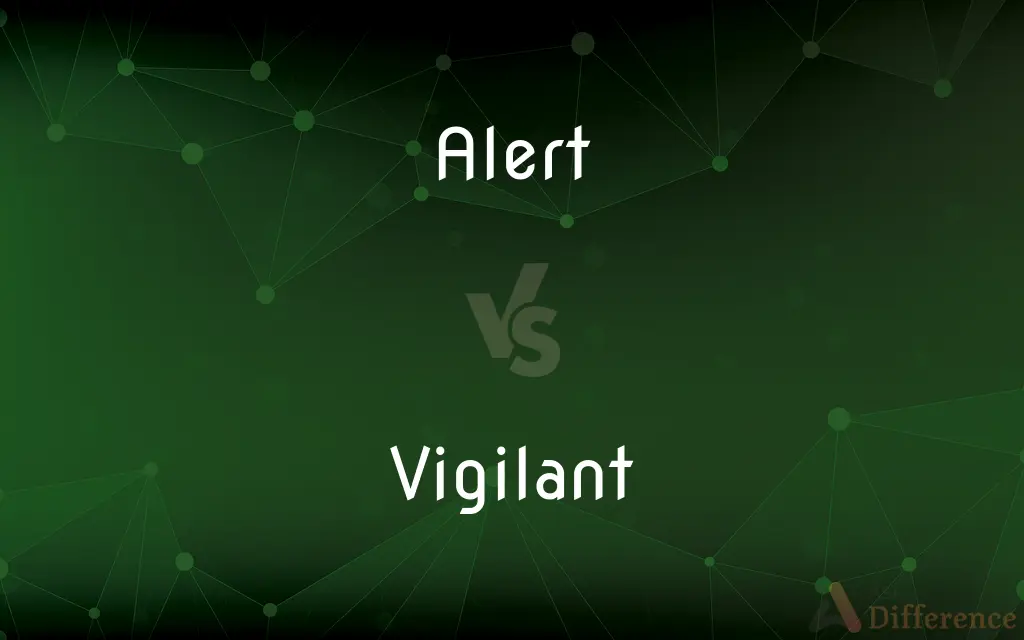Alert vs. Vigilant — What's the Difference?
By Tayyaba Rehman & Fiza Rafique — Updated on April 24, 2024
Alert refers to a sudden state of keen awareness due to an imminent danger; vigilant denotes a sustained state of watchfulness maintained over a long period.

Difference Between Alert and Vigilant
Table of Contents
ADVERTISEMENT
Key Differences
Alertness often describes a brief and immediate reaction to a specific situation, as when someone is jolted into heightened awareness by an alarm. Vigilance, on the other hand, implies a continuous state of alertness that is maintained over a longer period.
Being alert typically involves a quick response to environmental stimuli, suggesting a temporary state that can quickly dissipate. Vigilant individuals maintain their focus and readiness over time, often in anticipation of potential threats or issues.
The state of being alert can be triggered externally, such as by a loud noise or sudden movement. Whereas vigilance often requires internal motivation and sustained attention, regardless of external cues.
In emergency situations, alertness is crucial for immediate, short-term reaction to prevent harm or respond to a crisis. Vigilance is key in scenarios where threats may arise unpredictably over time, requiring ongoing attention and preparedness.
Individuals are often advised to stay alert to react to immediate dangers, while being vigilant is recommended in contexts where dangers are less immediate but potentially more complex or enduring.
ADVERTISEMENT
Comparison Chart
Definition
State of immediate awareness
Sustained watchfulness
Duration
Short-term
Long-term
Trigger
External (e.g., noises, alerts)
Internal or external consistency
Focus
Specific, immediate dangers
Broad, potential threats
Recommended Context
Emergencies
Security, surveillance
Compare with Definitions
Alert
Immediate awareness.
The loud crash put her on alert.
Vigilant
Maintaining careful watch.
Parents must be vigilant with young children.
Alert
Ready to face danger.
The soldiers were alert at their posts.
Vigilant
Guardedly aware of danger.
The guards were vigilant throughout the night.
Alert
Quick to perceive and act.
An alert mind quickly solves problems.
Vigilant
Continuously watchful.
He remained vigilant for signs of danger.
Alert
Marked by promptness.
His alert response saved the day.
Vigilant
Persistent in attention.
Vigilant monitoring was required for the project.
Alert
Warning signal.
The fire alarm was an alert to evacuate.
Vigilant
Alert to possible problems.
She was vigilant about her privacy.
Alert
Quick to notice any unusual and potentially dangerous or difficult circumstances; vigilant
An alert police officer discovered a lorry full of explosive
Schools need to be constantly alert to this problem
Vigilant
On the alert, as for danger or error; watchful.
Alert
The state of being watchful for possible danger
Security forces are on the alert for an upsurge in violence
Vigilant
Watchful, especially for danger or disorder; alert; wary
Be vigilant for signs of disease in your garden.
Alert
Warn (someone) of a danger or problem
Police were alerted after three men drove away without paying
He alerted people to the dangers of smoking
Vigilant
Attentive to discover and avoid danger, or to provide for safety; wakeful; watchful; circumspect; wary.
Sirs, take your places, and be vigilant.
Alert
Vigilantly attentive; watchful
Alert to danger.
An alert bank guard.
Vigilant
Carefully observant or attentive; on the lookout for possible danger;
A policy of open-eyed awareness
The vigilant eye of the town watch
There was a watchful dignity in the room
A watchful parent with a toddler in tow
Alert
Mentally responsive and perceptive; quick.
Alert
Brisk or lively in action
The bird's alert hopping from branch to branch.
Alert
A signal that warns of attack or danger
Sirens sounded the alert for an air raid.
Alert
A condition or period of heightened watchfulness or preparation for action
Nuclear-armed bombers were put on alert during the crisis.
Alert
To notify of approaching danger or action; warn
A flashing red light that alerted motorists to trouble ahead.
Alert
Attentive; awake; on guard.
Alert
(obsolete) brisk; nimble; moving with celerity.
Alert
An alarm.
Alert
A notification of higher importance than an advisory.
Alert
(military) A state of readiness for potential combat.
An airborne alert; ground alert
Alert
To give warning to.
Alert
Watchful; vigilant; active in vigilance.
Alert
Brisk; nimble; moving with celerity.
An alert young fellow.
Alert
An alarm from a real or threatened attack; a sudden attack; also, a bugle sound to give warning.
Alert
Condition of heightened watchfulness or preparation for action;
Bombers were put on alert during the crisis
Alert
A warning serves to make you more alert to danger
Alert
An automatic signal (usually a sound) warning of danger
Alert
Warn or arouse to a sense of danger or call to a state of preparedness;
The empty house alarmed him
We alerted the new neighbors to the high rate of burglaries
Alert
Very attentive or observant;
An alert and responsive baby is a joy
Caught by a couple of alert cops
Alert enough to spot the opportunity when it came
Constantly alert and vigilant, like a sentinel on duty
Alert
Mentally responsive;
An alert mind
Alert
Not unconscious; especially having become conscious;
The patient is now awake and alert
Alert
(usually followed by `to') showing acute awareness; mentally perceptive;
Alert to the problems
Alive to what is going on
Awake to the dangers of her situation
Was now awake to the reality of his predicament
Common Curiosities
What is the primary difference between being alert and being vigilant?
Being alert is a temporary state of readiness, while being vigilant involves prolonged watchfulness.
Can someone be both alert and vigilant?
Yes, one can be alert for immediate threats while maintaining a vigilant watch over longer periods.
What types of professions require high levels of alertness?
Professions like emergency responders, drivers, and machine operators require high levels of alertness to respond to immediate situations.
Are children naturally alert or vigilant?
Children are naturally alert to their immediate surroundings, but they typically develop vigilance as they grow and learn about broader safety concepts.
How can one train to be more alert?
Training focus and quick response to changes can enhance alertness.
Is being too vigilant a problem?
Excessive vigilance can lead to unnecessary stress or paranoia, so balance is key.
Why is vigilance important in security?
Vigilance helps in detecting and preventing potential threats before they can manifest.
What are some strategies to maintain vigilance in a monotonous job?
Regular breaks, changing tasks periodically, and maintaining physical activity can help keep one vigilant in monotonous roles.
What tools or practices can enhance personal vigilance?
Practices like mindfulness, regular security checks, and using apps that alert users to local safety updates can enhance personal vigilance.
How do different cultures view the concepts of being alert and vigilant?
Cultural perceptions vary; some value high alertness and vigilance as essential to safety and community protection, while others may prioritize these traits less in safer or more stable environments.
How does technology aid in vigilance?
Surveillance systems, alarms, and monitoring software are technological tools that enhance vigilance by providing continuous observation capabilities.
What role does alertness play in academic settings?
In academic settings, alertness facilitates quick comprehension and reaction to new information, enhancing learning and engagement.
How do animals exhibit alertness and vigilance?
Animals show alertness through immediate reactions to threats, like a deer bolting at a sound, and vigilance by monitoring their environment for predators over time.
Can alertness and vigilance be detrimental?
Excessive alertness might lead to anxiety, and too much vigilance can cause fatigue or paranoia, affecting mental health.
What is the psychological impact of being constantly vigilant?
Constant vigilance can lead to heightened stress levels and might contribute to long-term issues like burnout or chronic anxiety.
Share Your Discovery

Previous Comparison
Nevertheless vs. Nonetheless
Next Comparison
Wharf vs. PierAuthor Spotlight
Written by
Tayyaba RehmanTayyaba Rehman is a distinguished writer, currently serving as a primary contributor to askdifference.com. As a researcher in semantics and etymology, Tayyaba's passion for the complexity of languages and their distinctions has found a perfect home on the platform. Tayyaba delves into the intricacies of language, distinguishing between commonly confused words and phrases, thereby providing clarity for readers worldwide.
Co-written by
Fiza RafiqueFiza Rafique is a skilled content writer at AskDifference.com, where she meticulously refines and enhances written pieces. Drawing from her vast editorial expertise, Fiza ensures clarity, accuracy, and precision in every article. Passionate about language, she continually seeks to elevate the quality of content for readers worldwide.














































